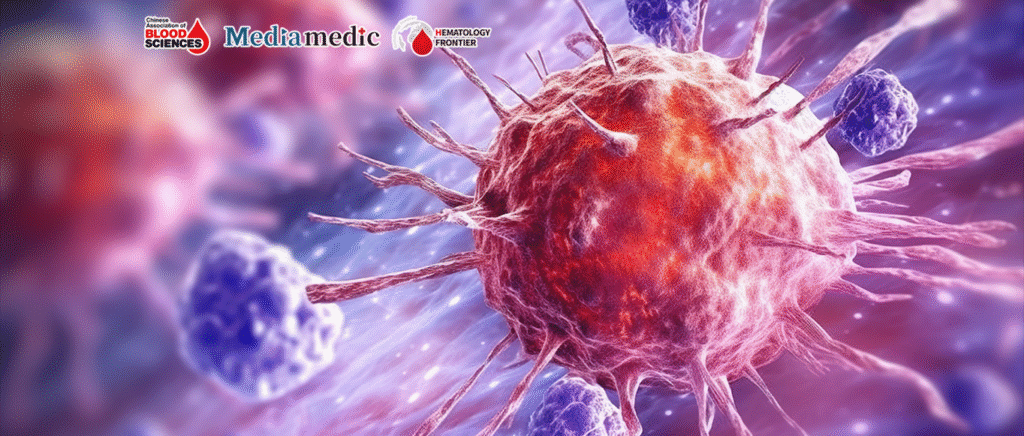
Acute myeloid leukemia (AML) is a heterogeneous hematologic malignancy characterized by clonal expansion of myeloid precursor cells. Cytarabine (Ara-C) remains a cornerstone of induction chemotherapy; however, primary and acquired resistance to Ara-C significantly limits its therapeutic efficacy. Emerging studies have suggested that immune checkpoint and receptor molecules may influence tumor chemosensitivity, yet the role of TREML2, a member of the TREM family, has remained largely unexplored in the AML context. This article, published in Blood Science, investigated TREML2 expression in AML and uncovered its role in modulating responsiveness to Ara-C.TREML2 is Downregulated in AML and Associated with Poor Prognosis
Analysis of The Cancer Genome Atlas (TCGA) dataset showed that TREML2 expression is significantly decreased in AML samples compared to normal controls. This finding was validated by RT-PCR and Western blotting in 15 patient samples. Clinically, low TREML2 expression was correlated with significantly poorer overall survival, supporting its potential role as a prognostic biomarker.

(Blood Science. 7(2):e00223, June 2025.)
TREML2 Knockdown Reduces Ara-C Sensitivity in AML Cells
To explore the functional role of TREML2, AML cell lines were transfected with TREML2-shRNA. Knockdown cells displayed higher proliferation and reduced apoptosis following Ara-C treatment compared to controls. These results indicate that TREML2 downregulation confers resistance to Ara-C.
TREML2 Overexpression Enhances Ara-C Sensitivity
Conversely, overexpression of TREML2 in THP-1 and U937 cells resulted in increased apoptosis and decreased viability after Ara-C exposure. These in vitro results suggest that TREML2 positively regulates chemotherapy responsiveness.
TREML2 Overexpression Suppresses Tumor Growth in Vivo
In a xenograft mouse model, TREML2-overexpressing THP-1 cells formed smaller tumors with lower weights compared to controls. Moreover, Ara-C treatment further reduced tumor volume in TREML2-overexpressing mice, confirming its sensitizing role in vivo.
TREML2 Suppresses ERK Pathway Activity
RNA sequencing revealed that the MAPK/ERK pathway was significantly enriched in TREML2-deficient cells. Western blotting confirmed increased phosphorylation of ERK in TREML2-knockdown cells and decreased activation in TREML2-overexpressing cells. Pharmacological inhibition of ERK using SCH772984 partially restored Ara-C sensitivity in TREML2-deficient AML cells, indicating that TREML2 enhances Ara-C sensitivity primarily through inhibition of the ERK signaling cascade.
Discussion
This study highlights TREML2 as a critical modulator of Ara-C sensitivity in AML. TREML2 is significantly downregulated in AML, and its loss confers chemoresistance, while its restoration enhances apoptosis and reduces proliferation in response to Ara-C. Mechanistically, TREML2 suppresses ERK activation, a known pathway associated with AML progression and drug resistance.
The clinical significance of these findings is twofold: First, TREML2 expression may serve as a prognostic marker for AML outcomes. Second, therapeutic strategies that increase TREML2 expression or mimic its suppressive effect on ERK may improve chemotherapy response, particularly in TREML2-low patients. These findings may also guide future clinical trials combining Ara-C with ERK pathway inhibitors.
Conclusion
TREML2 plays a pivotal role in sensitizing AML cells to cytarabine by inhibiting the ERK signaling pathway. Its downregulation is associated with poor prognosis and decreased chemotherapy efficacy. Targeting the TREML2–ERK axis may offer a novel strategy to overcome drug resistance in AML and improve clinical outcomes.
Click the link to view the original article:

https://journals.lww.com/bls/fulltext/2025/06000/treml2_enhances_sensitivity_of_acute_myeloid.3.aspx


